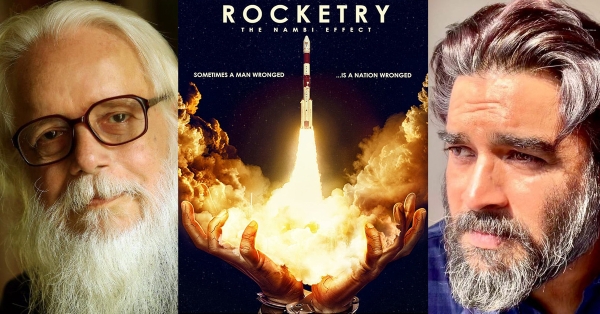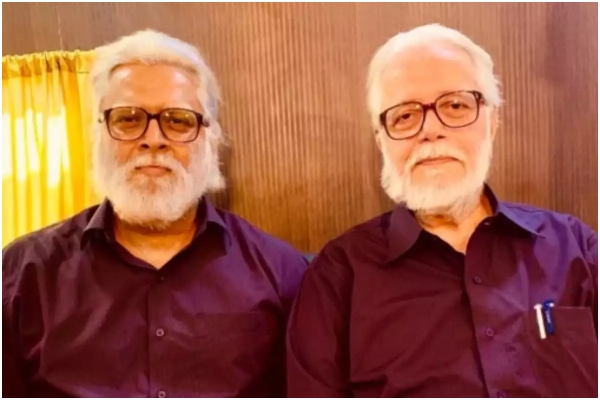Can Rocketry At Last Herald ‘Science’ in Indian Cinema?
05 Apr 2021 17:53:23
Indian cinema is exceptionally deficient in the genre of science. Finding credible movies from this genre in a romance-infested Indian cinema is as arduous as finding a needle in a haystack. However, whenever there is an advertisement of any movie that comes close to this genre, naturally, it rouses curiosity. One such upcoming movie is Rocketry: The Nambi Effect, based on Padma Bhushan Nambi Narayanan's life.
India takes great pride in its commercial music, television, and cinema. It is perhaps the nation's most potent soft-power tool, and its potency is very well known to India's friends and foes. India also is a knowledge-venerating society and has always revered scholars and enterprising innovators. But then again, our pride in popular cinema and our reverence for scholars never blended. The trailer of the movie Rocketry had many surprises, certainly beyond the surprise cameos of Suriya and Shahrukh Khan. When did Indian cinema ever depict Vikram Sarabhai in a movie? This movie shows him for the first time. The last time Sarabhai's name cropped up, was 17 years ago, in Ashutosh Gowariker's Swades when the protagonist makes his mind of leaving NASA for ISRO's 'Vikram Sarabhai' Space Centre.

There were two other surprises in the trailer. In one scene, R. Madhavan, who plays Nambi Narayanan, is shown walking with his colleagues through a rocket-engine workshop wearing aprons of SEP. SEP stands for the Societe Europeenne de Propulsion, which today goes by the name of SAFRAN. This is the same SAFRAN that has made the engines of the Rafale fighter aircraft bought by India, after great anguish given by vested interests. The third surprise was in another snippet that showed a table- and standee flag of GLAVKOSMOS and a poster of the Soviet space shuttle Buran. These three props appear in the backdrop when Rocketry's protagonist exchanges handshakes with his Soviet counterpart. GLAVKOSMOS is the same Russian entity that agreed to provide the upper-stage cryogenic engine to ISRO, which was curtailed by the Clinton Administration and later put Nambiji in tremendous personal upheavel. Whereas the poster of Buran, which carried the logo, SCC. Not many would know SCC stands for Space Commerce Corporation, which was the first US-Soviet joint-venture intended to provide Soviet space technology products across the Iron Curtain in the West. For the uninitiated and uninformed, the snippet shows Nambiji's prowess and acumen in bypassing through the corridors of geopolitical hyper-powers and making his mark for India's cause. There are also few snippets where one might have come across a character playing formidable Satish Dhawan, the former chair of ISRO. We can also see another actor playing the people's President APJ Abdul Kalam's role, who tells Nambiji, "It's time for you to take us to the stars!" All these are evidences of a well-researched movie.
Since this is a biography, the viewers may see many scenes based on Nambiji's anecdotes and personal life, many taken with cinematic liberties. However, the movie seems to have tamed unwanted urge for such privileges, which often eat away the touch of hard reality. But this article is not a trailer reaction review - but a review of the state of Indian science in popular Indian cinema. Does it exist?
Indian popular cinema has rarely edu-tained and has been far away from science. Perhaps there is a lack of scientific acumen on the parts of financiers, directors, and script-writers. Likewise, those pursuing Indian science have rarely spoken about the science in a way that excites the masses. Since we are a young nation, many of our thrilling achievements in the space, bioscience, chemical, atomic, and defense sectors are still sealed in caskets of official secrets or are untapped. But once these caskets open, as time passes, we have a plethora of stories to tell in the history and biography genres. But what about soft- and hard-fiction? We all lament the absence of movies and documentaries like Interstellar, Inception, Tenet, Contact, Space Odyssey, or The Martian. Those who attempt similar genres in India tend to ape their inspirations because there is a lack of dialogue between the scientific and cinematic world. But who will create such a dialogue between the two worlds? The government? Certainly not.
Indian cinema will suffer if it continues to serve value-less junk entertainment. Indian science may also suffer too if it does not deduce intelligent ways to tell stories and inspire the next generations to take up science. If India wants to become an Aatmanirbhar Bharat, it will have to educate and entertain the young ones with equal nourishment. And for this great cause able scientists and moviemakers should collaborate often.

Nambiji's life is exceptional, and it was asking to be nurtured into a story with care. So are the lives of Homi Bhabha, Vikram Sarabhai, and APJ Abdul Kalam. Indian cinema has for long had a penchant for politicians, sportsters, actors, and especially frauds. The recent high they have got is of making movies on a certain market bull. But have they ever cared to tell the story of the Bull - Col. Narendra Kumar? The great mountaineer, the champion of Operation Meghdoot, saved Siachen from China and Pakistan's clutches. Such stories won't be told until Indian cinema gets rid of its fascination for the don's cinematic universe and is indebted to the don's finances and his siblings, friends, foes, contemporaries in the North, and contemporaries in the South.
The cinematic taste of modern Indians is evolving. Some think by evolving, we are aping the West. But that is not the case at all. We want to know more, more about individuals who have brought glory to Bharat for millennia. We want to know more about great events in our civilization's chronicle. We want to learn more about our fiction, our epics, our successes, our failures.
Modern Indians are very well aware of the stale content they have been served in the name of cinema and what are the intentions behind those serving it. Modern Indians now are very well aware of cinema and cinema influencers being used as part of vile information, disinformation, and misinformation warfare by India's adversaries. With such a realisation, the old 'filmy' gimmicks and shenanigans and those performing it are becoming obsolete.
Rocketry's trailer is quite promising and due credit to Madhavan, who has directed and produced it. It does not seem to disrespect the protagonist and his pursuit's seriousness, with needless song and dance. Despite the absence of usual desi cinema cliches, the movie may attract footfall. If it doesn't manage theatre viewership, in the wake of the pandemic, it may as well become a cult classic. But on a larger canvas of time, the movie has all the makings of becoming a pioneer in the biographical genre on scientists and to stretch expectations even science and science-fiction genres. If that happens, then the theory that sustained dishing stale content to us Indians will fall on its face. However, these are not the expectations from one movie. These are the expectations of a middle-class, modern, and educated Indian from Indian Cinema.
.
.